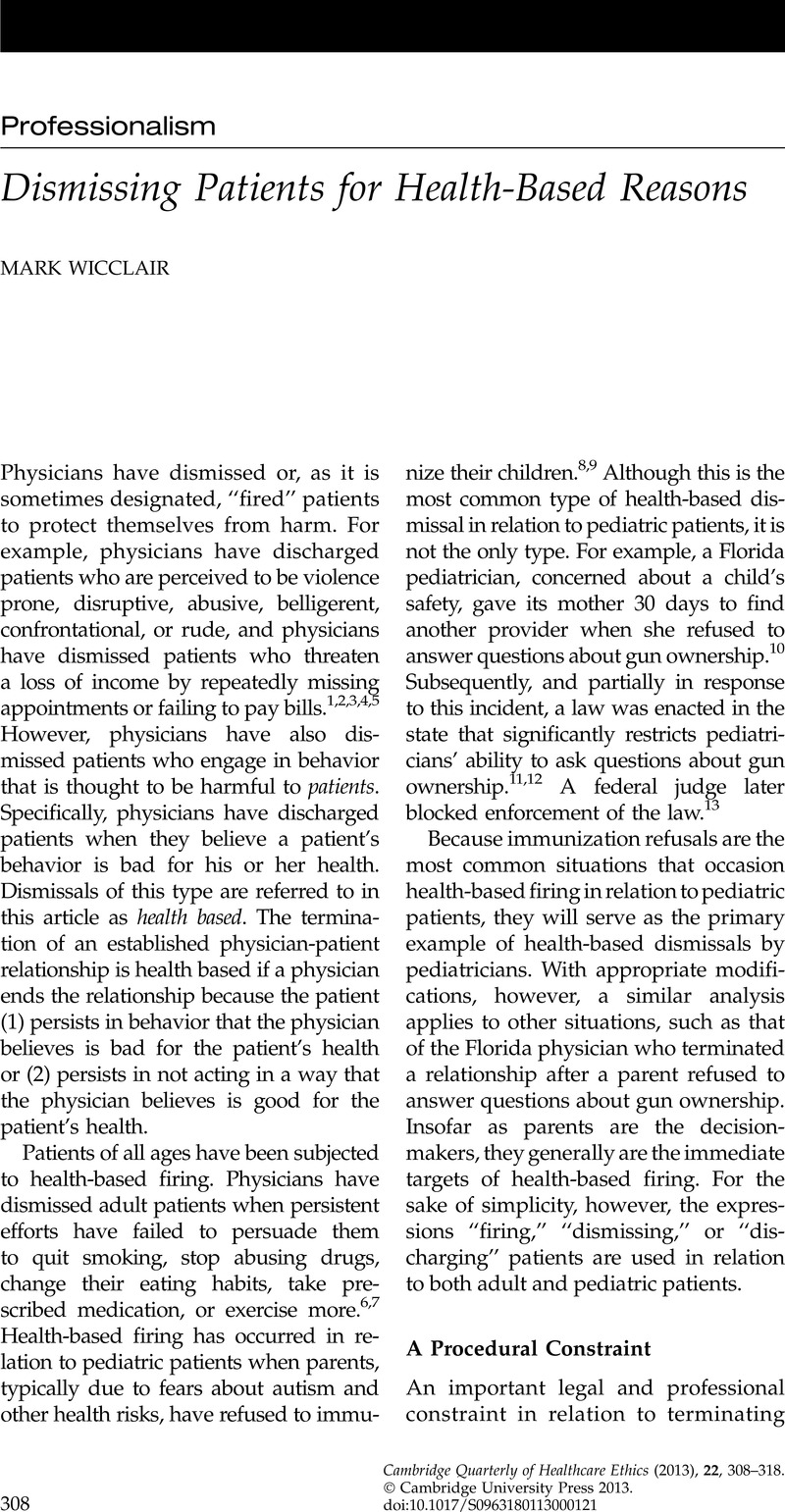Published online by Cambridge University Press: 30 April 2013

1 Lippman, H, Davenport, J.Patient dismissal: The right way to do it. The Journal of Family Practice 2011;60(3):135–40.Google ScholarPubMed
2 Farber, NJ, Jordan, ME, Silverstein, J, Collier, VU, Weiner, J, Boyer, G.Primary care physicians’ decisions about discharging patients from their practices. Journal of General Internal Medicine 2008;23(3):283–7.Google Scholar
3 Willis, DR, Zerrrr, A.Terminating a patient: Is it time to part ways? Family Practice Management 2005;142:560–82.Google Scholar
4 Sampson, F, Munro, J, Pickin, M, Nicholl, J.Why are patients removed from their doctors’ lists? A comparison of patients’ and doctors’ accounts of removal. Family Practice 2004;21(5):515–8.Google Scholar
5 Cummings, R, Young, S.Patient removals. Health Service Journal 2000;110:26–7.Google Scholar
6 Herring, ME, Erde, EL.HMO doctor—for nonsmokers only? Cambridge Quarterly of Healthcare Ethics 1994;3:67–70.Google Scholar
7 Beck M. The doctor will never see you again. The Wall Street Journal Health Journal 2010 Feb 8; available at http://online.wsj.com/article/SB10001424052748703630404575053221001720404.html (last accessed 5 July 2012).
8 See note 7, Beck 2010.
9 Flanagan-Klygis, EA, Sharp, L, Frader, JE.Dismissing the family who refuses vaccines: A study of pediatrician attitudes. Archives of Pediatrics and Adolescent Medicine 2005;159:929–34.Google Scholar
10 Hiers F. Family and pediatrician tangle over gun question. Ocala Star Banner 2010 July 24; available at http://www.ocala.com/article/20100724/ARTICLES/7241001?tc=ar (last accessed 5 July 2012).
11 Florida Patient’s Bill of Rights and Responsibilities (Florida XXIX 381.026); available at http://www.leg.state.fl.us/statutes/index.cfm?App_mode=Display_Statute&Search_String=&URL=0300-0399/0381/Sections/0381.026.html (last accessed 12 June 2012).
12 Marcus EN. Gun query off limits for doctors in Florida. New York Times 2011 Aug 8:D5.
13 Florida: Law restricting queries on guns is halted. New York Times 2011 Sept 15:A16.
14 Barratt, K.Avoid patient abandonment—how to properly end a relationship with your patient. Wisconsin Medical Journal 1996 Dec:875–7.Google Scholar
15 Devlin, MM.Patient abandonment. Journal of Medical Practice Management 1987;3(2):135–8.Google Scholar
16 Santalucia, C, Michota, FA.When and how is it appropriate to terminate the physician-patient relationship? Cleveland Clinic Journal of Medicine 2004;71(3):179–83.Google Scholar
17 Thieman, S.Avoiding the claim of patient abandonment. Missouri Medicine 1996;93(10):634–5.Google Scholar
18 American Medical Association Council on Ethical and Judicial Affairs. Termination of the physician-patient relationship. Code of Medical Ethics: Current Opinions, 2010–2011 ed. Chicago: American Medical Association; 2010, at 278.
19 Quill, TE, Cassel, CK.Nonabandonment: A central obligation for physicians. Annals of Internal Medicine 1995;122(5):368–74.Google Scholar
20 See note 19, Quill, Cassel 1995, at 368.
21 Pellegrino, ED.Nonabandonment: An old obligation revisited. Annals of Internal Medicine 1995;122(5):377–8.Google Scholar The exchange between Quill and Cassel and Pellegrino on nonabandonment is shaped in part by their respective views on appropriate responses to patients who want assistance in dying. Quill and Cassel enlist their expansive conception of abandonment to suggest that, depending on the circumstances, refusing to actively or passively assist patients who want to die can be characterized as abandonment. Pellegrino’s critique of Quill and Cassel’s expansive conception of abandonment is directed in part at their use of it to justify offering such assistance.
22 American Medical Association Council on Ethical and Judicial Affairs. The patient-physician relationship. Code of Medical Ethics: Current Opinions, 2010–2011 ed. Chicago: American Medical Association; 2010, at 374.
23 Snyder, L.American College of Physicians Ethics Manual, 6th ed. Annals of Internal Medicine 2012;156(1):75.Google Scholar
24 General Medical Council, Good Medical Practice: Duties of a Doctor; available at http://www.gmc-uk.org/guidance/good_medical_practice/duties_of_a_doctor.asp (last accessed 12 June 2012).
25 Pellegrino, ED.The internal morality of clinical medicine: A paradigm for the ethics of the helping and healing professions. Journal of Medicine and Philosophy 2001;26(6):559–79.Google Scholar
26 Pellegrino, ED, Thomasma, DC.The Virtues in Medical Practice. New York: Oxford University Press; 1993.Google Scholar
27 May, WF.Code, covenant, contract, or philanthropy. The Hastings Center Report 1975;5(6):29–38.Google Scholar
28 Daniels, N.Just Health: Meeting Health Needs Fairly. Cambridge: Cambridge University Press; 2008.Google Scholar
29 Childress, JF, Siegler, M.Metaphors and models of doctor-patient relationships: Their implications for autonomy. Theoretical Medicine 1984;5:17–30.Google Scholar
30 Capozzi, JD, Rhodes, R, Gantsoudes, G.Terminating the physician-patient relationship. Journal of Bone and Joint Surgery 2008;90:208–10.Google Scholar
31 See note 6, Herring 1994.
32 See note 7, Beck 2010.
33 See note 9, Flanagan-Klygis et al. 2005.
34 Wicclair, MR.Conscientious Objection in Health Care: An Ethical Analysis. Cambridge: Cambridge University Press; 2011.Google Scholar
35 LaMendola B. Some ob-gyns in south Florida turn away overweight women. SunSentinal.com 2011 May 16; available at http://articles.sun-sentinel.com/2011-05-16/health/fl-hk-no-obesity-doc-20110516_1_gyn-ob-gyn-obese-patients (last accessed 7 June 2012).
36 Bates, DW, Gawande, AA.The impact of the internet on quality measurement. Health Affairs 2000;19(6):104–14.Google Scholar
37 Schneider, EC, Epstein, AM.Influence of cardiac-surgery performance reports on referral practices and access to care: A survey of cardiovascular specialists. New England Journal of Medicine 1996;335(4):251–6.Google Scholar
38 Sharkey, K, Gillam, L.Should patients with self-inflicted illness receive lower priority in access to healthcare resources? Mapping out the debate. Journal of Medical Ethics 2010;36(11):661–5.Google Scholar
39 Minkler, M.Personal responsibility for health? A review of the arguments and the evidence at century’s end. Health Education and Behavior 1999;26:121–40.Google Scholar
40 Wikler, D.Who should be blamed for being sick? Health Education and Behavior 1987;14:11–25.Google ScholarPubMed
41 Church, TS, Thomas, DM, Tudor-Locke, C, Katzmarzyk, PT, Earmest, CP, Rodarte, RQ, et al. . Trends over 5 decades in U.S. occupation-related physical activity and their associations with obesity. Plos ONE 2011;6(5):e19657.CrossRefGoogle ScholarPubMed
42 Martin, MW.Responsibility for health and blaming victims. Journal of Medical Humanities 2001;22(2):95–114.Google Scholar
43 Dworkin, G.Taking risks, assessing responsibility. The Hastings Center Report 1981;11(5):26–31.Google Scholar
44 Veatch, RM.Voluntary risks to health: The ethical issues. JAMA 1980;243:50–5.Google Scholar
45 General Medical Council UK. Good Medical Practice; 2006, at 10; available at http://www.gmc-uk.org/guidance/good_medical_practice.asp (last accessed 6 July 2012).
46 Diekema, DS.American Academy of Pediatrics Clinical Report: Responding to parental refusals of immunization of children. Pediatrics 2005;115(5):1428–31.Google Scholar
47 See note 35, LaMendola 2011.
48 See note 10, Hiers 2012.
49 British Medical Association, General Practitioners Committee. Removal of Patients from GP Lists; 2005 April; available at http://bma.org.uk/practical-support-at-work/doctors-as-managers/managing-your-practice (last accessed 6 July 2012).